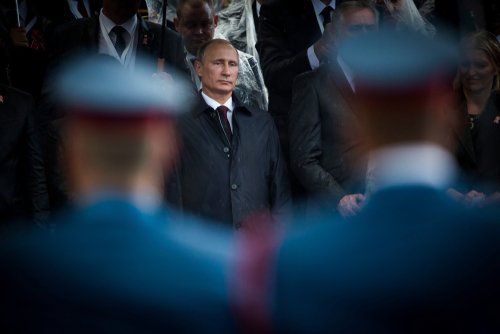Greece (Brussels Morning Newspaper), On Wednesday, Russian President Vladimir Putin stressed that Russia has no aggressive intentions toward NATO member states such as Poland, the Baltic republics, or the Czech Republic, dismissing the possibility of any planned assault as ludicrous. In a talk with Russian air force pilots, he emphasized the lack of preparations to attack these countries, dismissing such fears as baseless. This comment was issued amid rising tensions following Russia’s 2022 invasion of Ukraine, which dramatically strained Moscow’s relations with the West.
Putin also addressed Western nations’ decision to supply Ukraine with F-16 fighter jets, claiming that Russia will shoot down the planes, just as it has targeted other military equipment supplied to Ukraine. He cautioned that if these jets flew from third-country airfields, Russia would consider them acceptable targets. His statements coincided with Ukrainian Foreign Minister Dmytro Kuleba’s declaration that the F-16s would be transferred to Ukraine in the next months, a move that Ukraine has long wanted in its ongoing struggle with Russia.
In a paraphrase of international law, President Putin suggests that any target utilized for purposes beyond its inherent nature, such as public buildings, schools, or even hospitals operating as covert military bases, may be considered military targets. He states that according to this interpretation, every NATO military base is not inherently a target for Russia unless it participates in military missions in Ukraine. This diplomatic and military maneuver allows for the expansion of military operations without signaling the onset of a generalized conflict between the Alliance and Russia.
This statement highlights a strategic ambiguity that allows for the selective targeting of military assets while avoiding a broad escalation of hostilities. It reflects a nuanced approach to warfare, where actions are calibrated to achieve specific objectives without necessarily triggering a full-scale conflict. This interpretation of international law serves as a tool for Russia to justify its military actions while attempting to mitigate the risk of broader confrontation with NATO. However, it also underscores the complex dynamics and potential consequences of military operations conducted within the framework of international law and diplomatic maneuvering.
NATO Secretary General’s statement on the second anniversary of Russia’s full-scale invasion of Ukraine brought the situation to another level. As article 5 states an attack to any member of the Alliance is like attacking the Alliance as a whole.
“We are helping to make your forces more and more interoperable with Allies. We will open a new Joint Analysis, Training, and Education Centre in Poland together. And we are deepening our political ties through the NATO-Ukraine Council, where we consult and make decisions together. Ukraine will join NATO. It is not a question of if, but of when. As we prepare you for that day, NATO will continue to stand with Ukraine. For your security, and ours” stated Jens Stoltenberg.
This statement emphasizes NATO and its member states’ strong commitment to Ukraine’s security and sovereignty. It underlines NATO’s support for Ukraine’s right to self-defense and control over its security arrangements, including its desire to join NATO.
The NATO-Ukraine alliance has strong historical roots, stretching back to the early 1990s and growing into one of NATO’s most significant relationships. Since Russia’s illegal annexation of Crimea in 2014, cooperation between NATO and Ukraine has grown, particularly in vital areas of military and security. Following Russia’s full-scale invasion of Ukraine in 2022, NATO has increased its support to unprecedented levels.
While NATO as a whole Alliance has not actively supplied weaponry to Ukraine, individual member nations such as the United States, United Kingdom, Germany, and Turkey have provided military support. This aid consists of anti-tank weapons, missile defense systems, artillery guns, tanks, and military drones.
Furthermore, the US and UK have provided long-range missiles, with the US allowing Denmark and the Netherlands to deploy US-built F-16 fighter jets to Ukraine once pilots have been trained. However, NATO member nations have refrained from sending troops to Ukraine and have ruled out imposing a no-fly zone over the country, fearing that such moves might escalate tensions with Russia into outright conflict.
The criticism of Russia’s activities as a “brutal and unprovoked war of aggression” emphasizes the gravity of the situation and NATO’s support for Ukraine as an independent, peaceful, and democratic nation.
NATO and its Allies continue to provide strong military and political support to Ukraine in defending its fundamental right to self-defense. This assistance comprises military, logistical, and diplomatic support, all of which are intended to assist Ukraine in resisting and repelling Russian aggression.
Overall, this declaration underscores NATO’s strong commitment to the ideals of collective defense, member-state solidarity, and support for allies facing external attack. It also emphasizes the Alliance’s function as a safeguard against threats to security and stability in Europe and elsewhere.




